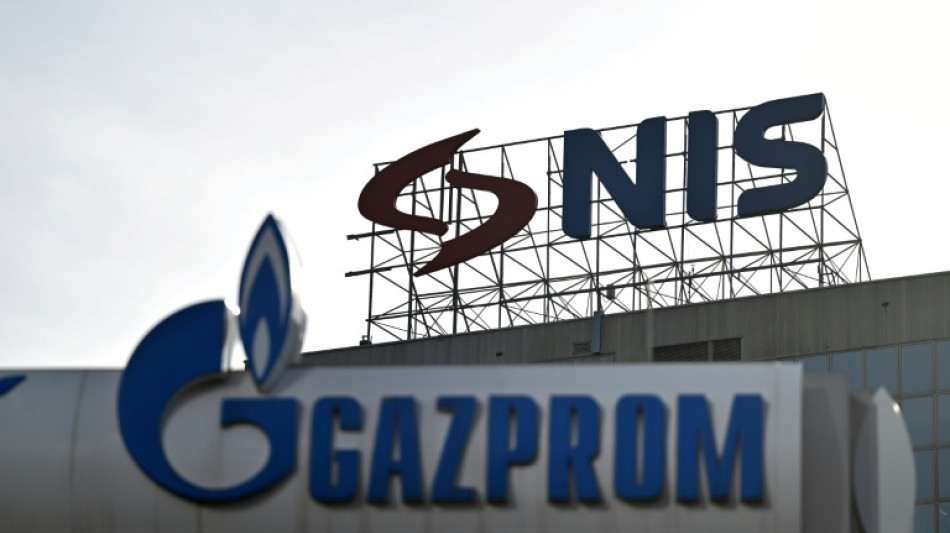
-
 Nasdaq rallies again while yen falls despite BOJ rate hike
Nasdaq rallies again while yen falls despite BOJ rate hike
-
Bologna win shoot-out with Inter to reach Italian Super Cup final

-
 Brandt and Beier send Dortmund second in Bundesliga
Brandt and Beier send Dortmund second in Bundesliga
-
Trump administration begins release of Epstein files

-
 UN Security Council votes to extend DR Congo mission by one year
UN Security Council votes to extend DR Congo mission by one year
-
Family of Angels pitcher, club settle case over 2019 death

-
 US university killer's mystery motive sought after suicide
US university killer's mystery motive sought after suicide
-
Rubio says won't force deal on Ukraine as Europeans join Miami talks

-
 Burkinabe teen behind viral French 'coup' video has no regrets
Burkinabe teen behind viral French 'coup' video has no regrets
-
Brazil court rejects new Bolsonaro appeal against coup conviction

-
 Three-time Grand Slam winner Wawrinka to retire in 2026
Three-time Grand Slam winner Wawrinka to retire in 2026
-
Man Utd can fight for Premier League title in next few years: Amorim

-
 Pandya blitz powers India to T20 series win over South Africa
Pandya blitz powers India to T20 series win over South Africa
-
Misinformation complicated Brown University shooting probe: police

-
 IMF approves $206 mn aid to Sri Lanka after Cyclone Ditwah
IMF approves $206 mn aid to Sri Lanka after Cyclone Ditwah
-
Stocks advance as markets cheer weak inflation

-
 Emery says rising expectations driving red-hot Villa
Emery says rising expectations driving red-hot Villa
-
Three killed in Taipei metro attacks, suspect dead

-
 Seven Colombian soldiers killed in guerrilla attack: army
Seven Colombian soldiers killed in guerrilla attack: army
-
Amorim takes aim at Man Utd youth stars over 'entitlement'

-
 Mercosur meets in Brazil, EU eyes January 12 trade deal
Mercosur meets in Brazil, EU eyes January 12 trade deal
-
US Fed official says no urgency to cut rates, flags distorted data

-
 Rome to charge visitors for access to Trevi Fountain
Rome to charge visitors for access to Trevi Fountain
-
Spurs 'not a quick fix' for under-fire Frank

-
 Poland president accuses Ukraine of not appreciating war support
Poland president accuses Ukraine of not appreciating war support
-
Stocks advance with focus on central banks, tech

-
 Amorim unfazed by 'Free Mainoo' T-shirt ahead of Villa clash
Amorim unfazed by 'Free Mainoo' T-shirt ahead of Villa clash
-
PSG penalty hero Safonov ended Intercontinental win with broken hand

-
 French court rejects Shein suspension
French court rejects Shein suspension
-
'It's so much fun,' says Vonn as she milks her comeback

-
 Moscow intent on pressing on in Ukraine: Putin
Moscow intent on pressing on in Ukraine: Putin
-
UN declares famine over in Gaza, says 'situation remains critical'

-
 Guardiola 'excited' by Man City future, not pondering exit
Guardiola 'excited' by Man City future, not pondering exit
-
Czechs name veteran coach Koubek for World Cup play-offs

-
 PSG penalty hero Safonov out until next year with broken hand
PSG penalty hero Safonov out until next year with broken hand
-
Putin says ball in court of Russia's opponents in Ukraine talks
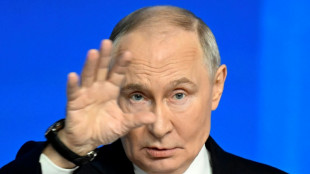
-
 Czech Zabystran upsets Odermatt to claim Val Gardena super-G
Czech Zabystran upsets Odermatt to claim Val Gardena super-G
-
NGOs fear 'catastrophic impact' of new Israel registration rules
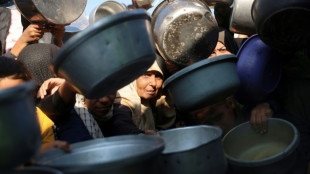
-
 US suspends green card lottery after MIT professor, Brown University killings
US suspends green card lottery after MIT professor, Brown University killings
-
Arsenal in the 'right place' as Arteta marks six years at club

-
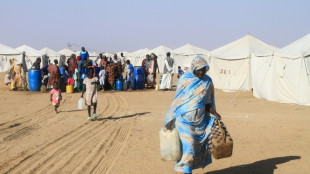 Sudan's El-Fasher under the RSF, destroyed and 'full of bodies'
Sudan's El-Fasher under the RSF, destroyed and 'full of bodies'
-
From farms to court, climate-hit communities take on big polluters

-
 Liverpool have 'moved on' from Salah furore, says upbeat Slot
Liverpool have 'moved on' from Salah furore, says upbeat Slot
-
Norway crown princess likely to undergo lung transplant

-
 Iraq negotiates new coalition under US pressure
Iraq negotiates new coalition under US pressure
-
France's budget hits snag in setback for embattled PM

-
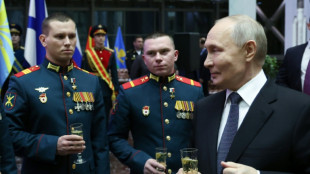 Putin hails Ukraine gains, threatens more, in annual press conference
Putin hails Ukraine gains, threatens more, in annual press conference
-
US suspends green card lottery after Brown, MIT professor shootings

-
 Chelsea's Maresca says Man City link '100 percent' speculation
Chelsea's Maresca says Man City link '100 percent' speculation
-
Dominant Head moves into Bradman territory with fourth Adelaide ton


US sanctions hit Serbia's oil firm
US sanctions on Serbia's majority-Russian-owned NIS oil company, which operates the country's sole refinery, took effect on Thursday after months of delay.
The United States sanctioned the company, Petroleum Industry of Serbia (NIS), in January as part of its crackdown on the Russian energy sector following Moscow's invasion of Ukraine in 2022.
After the sanctions came into force Thursday morning, NIS said it "had not yet been granted an extension of the special licence from the United States Department of the Treasury".
"NIS is working to overcome this situation," it said in a statement, adding it would work with the US Treasury to seek its removal from the sanctions list.
The company said it has "sufficient crude oil reserves for processing at this time, while petrol stations are fully supplied with all types of petroleum products".
President Aleksandar Vucic warned on Monday that the sanctions would have a serious impact and hit the banking sector first.
"There is no bank in the world that would risk violating US sanctions," Vucic said.
NIS confirmed it expects foreign payment cards to "cease functioning", with petrol stations accepting only Serbia's domestic card or cash.
- 'Operating as normal' -
A central NIS station in Belgrade was quiet on Thursday, as the head of the company's consumer arm told the state broadcaster that there was no need for motorists to panic buy.
"Our sales are operating as normal. There are no restrictions when it comes to the quantities customers can purchase," NIS Retail Director Bojana Radojevic said.
Croatian pipeline operator Janaf, which supplies oil to NIS, said it could take an 18-million-euro ($21 million) hit this year.
"The expectation that the US will lift the sanctions is irrelevant. They (NIS) put themselves in such a position, and they have to resolve it," Janaf chairman Stjepan Adanic told Croatian broadcaster HRT.
Vucic said earlier that talks were underway on the company's future, including the possible divestment of Russian shareholders.
With NIS supplying over 80 percent of Serbia's diesel and petrol, the effects could be widespread, Belgrade-based economist Goran Radosavljevic told AFP.
He warned that the sanctions could impact sectors ranging from finance to agriculture and affect Air Serbia's jet fuel supply.
"The financial sector will have to stop working with NIS –- halt all transactions and cooperation immediately -– to avoid being considered a bank dealing with a sanctioned entity," he said.
He said a potential solution -- a complete exit of the Russian holding from the company -- was unlikely.
"Russia does not want to sell its shares," Radosavljevic said, adding that although NIS represents "only a small portion of Gazprom's revenue, its political importance is huge".
Despite Western pressure, Serbia has maintained close ties with Moscow and refused to impose sanctions, even as it pursues European Union membership.
It is heavily dependent on Russian gas. A supply contract signed in spring 2022 is expiring, and talks are underway for a new deal.
NIS is 45-percent owned by Russia's Gazprom Neft.
Its parent company, Gazprom, transferred its 11-percent stake last month to Intelligence, a Saint Petersburg-based firm also linked to the Russian energy giant.
The Serbian state owns nearly 30 percent and the remainder is held by minority shareholders.
O.M.Souza--AMWN